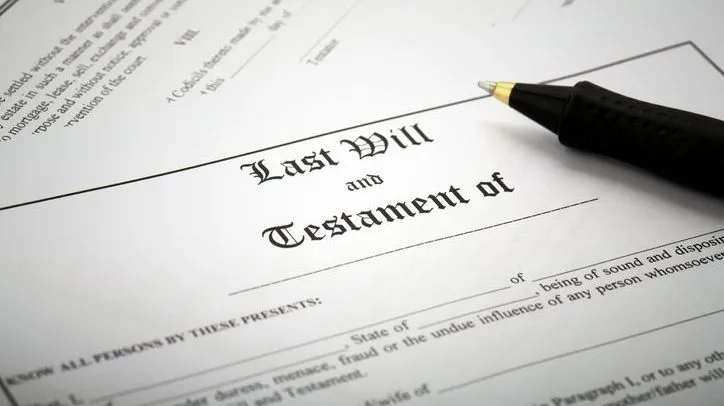While loving gestures and legal maneuvers might seem like things that don’t mix, these two ingredients come together when you’re writing a will. If you live in California, it’s crucial to be cognizant of the state’s laws and statutes that affect how to pass on your wealth to your beneficiaries through a will. Here’s what to consider when writing a will if you live in California.
A financial advisor can help you manage your assets while you’re alive and potentially maximize what you leave to your heirs. Connect with a fiduciary advisor today.
Steps to Write a Will If You Live in California
Writing a will in California means gathering the necessary information, making important decisions about how your assets will be distributed and processing paperwork correctly. Here’s a step-by-step guide to help make the process run smoothly.
1. Select the Assets to Include
Identify and list all the assets that you want to distribute through your will. This may include real estate, bank accounts, investments, personal property, among other assets. Creating a will requires all the relevant details, such as account numbers, proof of ownership, addresses and contact information.
Remember, the more prep you do ahead of time, the more clarity and ease your executor will have when distributing assets. This translates to less stress for your beneficiaries when dealing with the probate process.
Additionally, some assets, such as life insurance, have a built-in beneficiary designation, meaning the payment will go to the named beneficiary, regardless of your will. So, it’s important to understand how your will interacts with these types of assets and set the appropriate expectations for your heirs.
2. Name Your Beneficiaries
Next, determine the beneficiaries for each of your assets. Doing so involves specifying who will receive what portion of your estate.
This step can be simple if you want to pass everything on to your living spouse because of California’s community property laws. Specifically, the law states that you and your spouse have equal claim to all the assets you’ve acquired during marriage.
As a result, if you pass away without a will (also known as dying intestate), your surviving spouse will receive all assets that fall under the community property statute. However, the state will divide the assets you obtained before marriage between your surviving relatives. In addition, the community property law doesn’t extend to children, so a will is the best way to ensure your wealth goes to your intended beneficiaries.
3. Assign a Guardian for Children
If you have minor children, decide on a guardian who will take care of them in the event of your death. It’s crucial to discuss this responsibility with the chosen guardian(s) beforehand to ensure the guardianship will be a good fit.
This step is vital for parents, even if you have a trust, life insurance and other instruments designed to help your children. While other assets can financially help your children, only a will can designate a guardian. As such, the will is an indispensable piece of your estate plan because it specifies who will care for your children.
Likewise, all the pet owners out there can name who will receive their beloved companions. Your will can name an owner for your cat, dog and other pets in your absence.
4. Choose an Executor
Select a person you trust to be the executor of your will. The executor is responsible for carrying out your will’s instructions, meaning it’s up to them to handle the necessary administrative tasks after your death.
An executor’s first duty is to file the will in a timely manner with the state after you pass away. California state law requires wills to be filed with the local probate court within thirty days of the testator’s death. Then, your executor will work with the court to interpret your will and distribute assets accordingly.
Because of the nature of the executor’s job, this person should be someone who understands your wishes and is on good terms with your family. In addition, this person should be trustworthy and prompt in taking care of their duties.
5. Create Your Will
Next, draft your will. You can find fillable online will forms that are valid in California, simplifying the process. Writing the will should take about 20 minutes or less if you’ve done adequate prep beforehand. Remember, it’s advisable to consult an attorney if you have questions or have trouble filling out the forms on your own.
6. Sign the Will with Witnesses Present
According to California law, the testator must sign their will in the presence of at least two witnesses. The witnesses then also sign the will to prove they saw you sign the document with a sound mind and without coercion.
Remember, these witnesses must be disinterested parties. In other words, they can’t be beneficiaries or receive compensation or gifts from you in any way.
After the signing is complete, take your will to get notarized. Doing so isn’t mandatory in California, but it adds an extra layer of validation to your will and can expedite the probate process.
7. Secure Your Will
Keep the original signed copy of your will in a secure physical location. It is recommended to store it in a fireproof safe or a safe deposit box. This way, it will stay intact.
In addition, make sure your executor knows where to find the will and how to access it (such as a key to unlock the safe). Doing so is essential because the physical documents of your will must go before a probate judge to take effect.
Reasons to Make a Will if You Live In California

A will is a critical part of your estate plan if you live in California because of the unique role it performs. Specifically, your will lets you pick your executor, the person who manages your estate after you’re gone. Otherwise, a probate court will select the executor, taking the decision out of your control.
The will also designates guardians for your children if you pass away, which no other document can do. This feature is crucial because it also allows you to choose who will manage the wealth on your children’s behalf until they come of age. Additionally, if you want to leave some of your wealth to charitable organizations, a will can make these wishes clear for your executor.
Types of Wills in California
Here are the types of wills in California accepts:
Statutory Wills
Statutory wills are the type this guide has discussed thus far. Specifically, statutory refers to the will template you can find online and fill out. The statutory form is only valid if you don’t tamper with the structure or fields within the form. However, if your estate is on the straightforward side, these forms may suffice for your situation. If the online form doesn’t meet your needs, an estate planning attorney is your best option for ensuring that your will is valid.
Holographic Wills
“Holographic” might sound like a fancy word, but it simply means handwritten. As a result, a holographic will is one you physically write yourself without the assistance of a fillable form. The entire form must consist of your handwriting, have your signature at the bottom and mention the date you wrote it. It doesn’t need to have witnesses.
While holographic wills can sound appealing because of their do-it-yourself nature, they’re also problematic for testators. The lack of witnesses leaves the will vulnerable to disputes in court. Additionally, they may contain vague language or express wishes that aren’t permissible under California law.
Arrested Wills
An attorney with expertise in California estate law carefully drafts an attested will. Upon completion, you must sign it in the presence of two or more witnesses, ensuring that none of them are beneficiaries. The fact that an attorney creates this type of will enhances its credibility in the eyes of probate courts.
California Last Will and Testament Requirements
To make a valid will in California, you must fulfill the following criteria:
- Age: The testator must be at least 18 years old.
- Mental capacity: You must be of sound mind and understand the implications of making a will. Additionally, you must be able to comprehend what property belongs to you and who your family members and other potential beneficiaries are. Remember, mental health issues that affect decision-making can impact this requirement.
- Free and voluntary: Your will must be made freely and voluntarily, without undue influence from others.
- Written form: The will must be in a physical form, whether handwritten or typed. Digital copies, like PDFs, are not valid.
- Signature: You’ll need to sign your will in front of two witnesses who are not beneficiaries of the will.
California Will Executor Requirements
California probate code gives testators a wide selection for who to name as executor with just two restrictions. First, the executor must be at least 18 years old. Second, they must display the necessary capabilities for managing your will.
As a result, the field for choosing your executor is wide open, given these two restrictions. So, a felony conviction doesn’t exclude someone from executorship, nor does living out of state. However, the loose guidelines don’t indicate that it’s advisable to pull someone off the sidewalk to be your executor. Careful consideration is necessary to choose an executor who acts with integrity and responsibility.
Revoking or Changing Your Will in California

Another advantage of a will is that you can revoke or change it while you’re still alive. These features allow for life changes, such as divorce or the birth of a grandchild.
Revoking your will means nullifying or canceling it. You can do so by destroying the physical copy or by writing a new will. Remember, the will with the most recent date is the one that will go into effect when you die. In addition, if your marriage ends after you write your will, the distributions you assigned to them are null unless you include a clause stating that the assets should go to your spouse regardless of your future marital status.
On the other hand, if you want to modify your will without destroying it and starting over, a codicil allows you to do so. A codicil is a document you attach to the will to change its dictates. This document has the same requirements as the will itself, meaning the testator must be of sound mind, write the codicil voluntarily and sign it with two witnesses present who add their signatures.
Remember, while a codicil is a convenient workaround to avoid writing a new will, adding multiple changes can create clutter and confusion to the will’s terms. While a single codicil might be manageable, writing a new will is recommended if you want to make significant adjustments.
Probate in California
A will is necessary because of the probate process in California. After a testator dies, the executor must bring the will to probate court within 30 days to validate it. The court processes the will and checks that the executor is ready to perform their duties (if not, the court will appoint another executor).
Then, the meat of the probate process takes place. Your executor will take inventory of your assets and debts, get certain assets (such as a house or a boat) appraised if necessary and use your estate to pay off any debts. Remember, creditors have first dibs on most of your assets, meaning your beneficiaries will receive whatever is left over after your executor addresses debt obligations. While these events occur, the probate court allows interested parties 120 days to dispute your will.
Once the debts are gone, the executor distributes assets according to your will. If the process goes smoothly, it can be over in several months. However, disputes that lead to legal battles can elongate the process, and settling a contested will can take years, leaving beneficiaries without distributions until the court rules on the will.
Avoiding Probate in California
California allows simplified processes for estates below certain values, avoiding full probate. For deaths on or after April 1, 2025, personal property with a gross value of up to $208,850 can be transferred via a Small Estate Affidavit. If the primary residence has a value of $750,000 or less, heirs may file a Petition to Determine Succession to Real Property instead of going through probate.
For deaths before April 1, 2025, those limits were $184,500 for combined real and personal property, and $166,250 for earlier periods. Estates exceeding these values generally require formal probate, which can span months and involve court fees.
These thresholds adjust every three years to account for inflation, with the next review scheduled for April 1, 2028.
Bottom Line
Crafting a will in California involves thoughtful consideration and a systematic approach to ensure a seamless probate process for your loved ones. Each step plays a crucial role, from listing and detailing your assets to naming beneficiaries, guardians and an executor.
Remember, the more groundwork you lay, the smoother the distribution process may be. In essence, creating a will isn’t just about creating a legal document; it’s a compassionate gesture toward those you care about, providing them with guidance, clarity and support when they need it most.
Estate Planning Tips
- Weaving together an estate plan that considers all your assets, family dynamics and debt obligations can be challenging. A financial advisor with estate planning expertise can help and finding a financial advisor doesn’t have to be hard. SmartAsset’s free tool matches you with vetted financial advisors who serve your area, and you can have a free introductory call with your advisor matches to decide which one you feel is right for you. If you’re ready to find an advisor who can help you achieve your financial goals, get started now.
- Estate taxes can take a chunk out of what you want to leave your heirs. While California doesn’t levy an estate tax, the federal government takes its cut from estates that are worth at least $13.99 million in 2025. As a result, avoiding it can help enlarge the inheritance you leave your loved ones.
Photo credit: ©iStock.com/rarrarorro, ©iStock.com/roberthyrons, ©iStock.com/shapecharge
